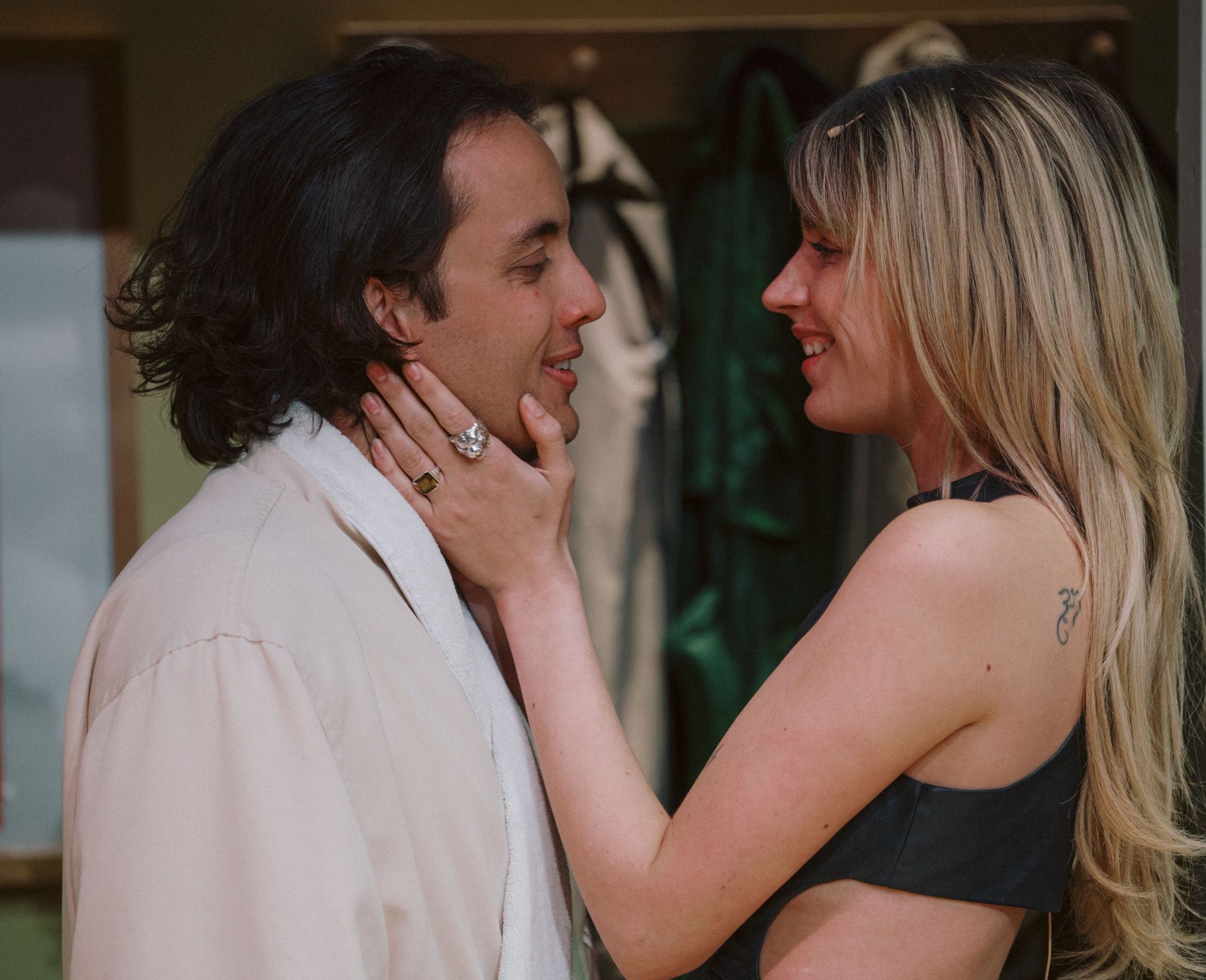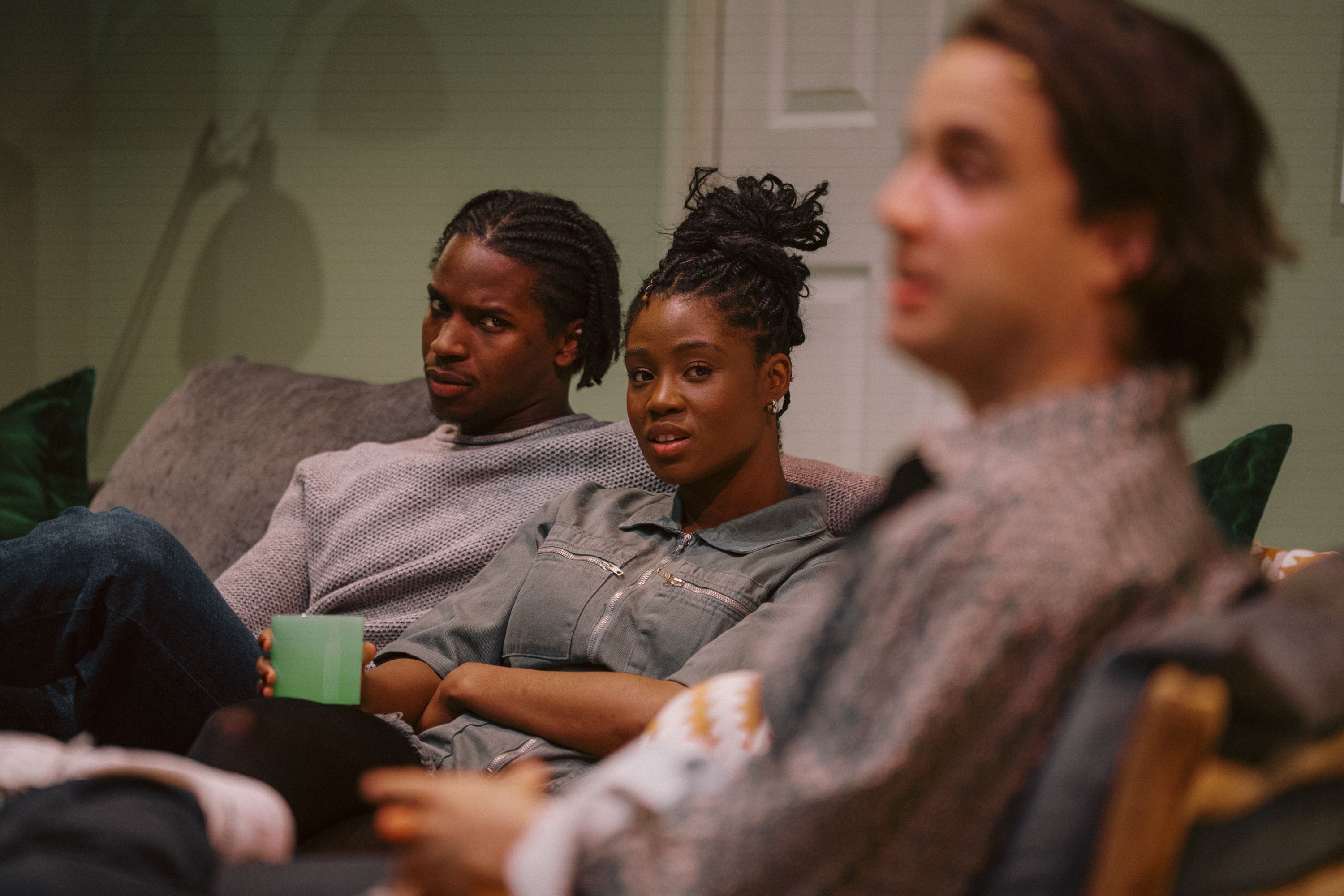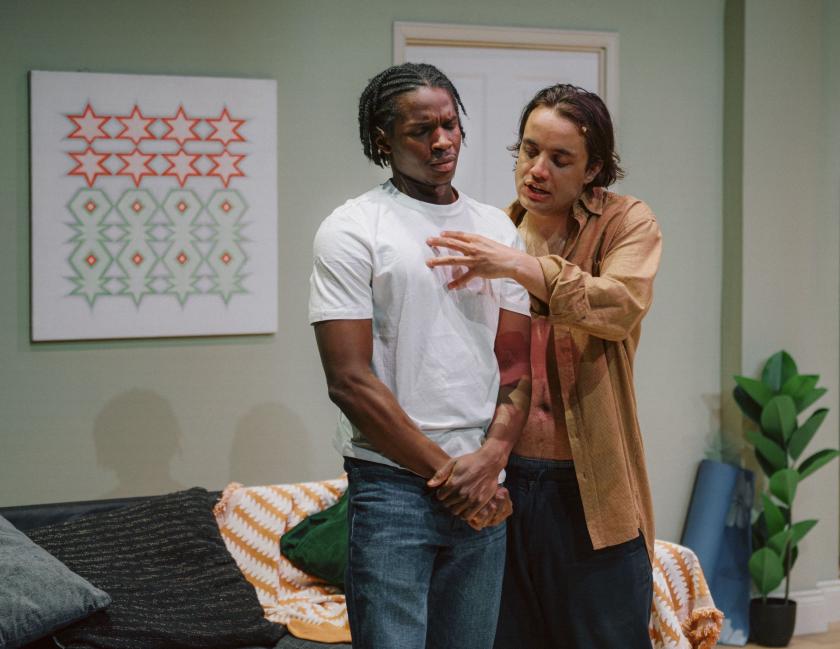Keelan Kember’s play Thanks for Having Me may look like a vehicle for Kedar Williams-Stirling (Sex Education, Red Pitch), but it’s more accurately a showcase for the comedic talents of Keelan Kember, a former OUDS performer with a TV pilot to his credit already. This 70-minute piece looks like another one.
The set alone suggests we are in sitcom territory, a fashionable pad belonging to Honey (Williams-Stirling), a 30-year-old accountant, though he styles himself as a wannabe musician to his dates. The latest of these is Maya (Adeyinka Akinrinade, pictured bottom, with Williams-Stirling), who arrives at his place for the first-date treatment. Honey has a well honed strategy: he announces early on that he doesn’t sleep with women on first dates, suggests going to a pub he knows is closed so how about a drink at his place, where he will ask if she likes Amy Winehouse, then segue from there into discussing the sad fragility of life. This last tactic inevitably propels them to make hay in the bedroom.
But Honey’s plans for the evening are shredded by texts from a friend’s girlfriend saying her eight-year relationship with Cashel (Keelan Kember) has just ended; seconds later Cashel himself calls to ask if he can come round. As he is phoning from right outside the flat, he arrives on the spot when Honey reluctantly says yes. Then he moves in.
 Cashel is, by his own description, a neurotic hypochondriac with food allergies and OCD tendencies. Or, to potential dates, “a poet”. He is driven to perform simple tasks, like spraying himself with cologne or buying crisps, in multiples of three, to avoid getting a brain haemorrhage. Yet he’s attractive enough to score highly with women, apparently. Maya briskly sets him up with her friend Eloise (Nell Tiger Free, pictured above with Keelan Kember), a scantily dressed trainee psychotherapist, who sums Cashel up as a “man-child”, though is happy to pursue a casual fling with him. The sum total of the plot is what happens to these four as they try to play the field, the men swapping ploys with mixed results.
Cashel is, by his own description, a neurotic hypochondriac with food allergies and OCD tendencies. Or, to potential dates, “a poet”. He is driven to perform simple tasks, like spraying himself with cologne or buying crisps, in multiples of three, to avoid getting a brain haemorrhage. Yet he’s attractive enough to score highly with women, apparently. Maya briskly sets him up with her friend Eloise (Nell Tiger Free, pictured above with Keelan Kember), a scantily dressed trainee psychotherapist, who sums Cashel up as a “man-child”, though is happy to pursue a casual fling with him. The sum total of the plot is what happens to these four as they try to play the field, the men swapping ploys with mixed results.
A 70-minute run-time is too short perhaps to expect significant character development, though the piece rattles along at speed and covers quite a lot of conversational ground. But most of the dialogue is dominated by Cashel, a debating champion who never stops talking. Much of the time his patter is well timed and witty – there’s a funny sequence where he tries to leave multiple voicemails for a would-be date, nervously digging himself deeper into trouble with each one – though longer stretches of it test the patience.
The two men have a companionable relationship, based on affection. The problem is that the relentless stream of verbiage from Cashel leaves neither him nor the audience any room for self-scrutiny or introspection. When Honey attempts some quiet rumination, Cashel soon interrupts him. Equally, we can’t make up our minds about the characters and their interactions because the script is constantly distracting us with its own wittiness and pronouncements. Which is fine, of course, in a sitcom, where characters are always having to score comedic points and plot overrides all other elements. But it’s slim pickings as drama.
The three actors coping with Cashel are a pleasure to watch, though, especially the personable Williams-Stirling, who gets a funny scene when he is caught out by Cashel for shopping at a farmer’s market to impress Maya, sniffing lavender soap and investing in expensive cheese: “You’re in a relationship!” Cashel cries. It’s the sort of piece, deftly directed by Monica Cox, you would be happy to catch at a fringe festival to send you home happy, especially if you are a man.
Women, not so much. Kember, you sense, would like to signpost his credentials as a feminist, but they are pretty much stated rather than earned. All the material is prime meat for him to turn into nicely executed gags, but what he actually means by them is hazy.
 The speech he gives Eloise to deliver, for example, about the woes of being an attractive woman – damned if she embarks on a relationship and her perfect image is ruined when inevitably her flaws emerge, equally damned as a bitch if she walks away from an entanglement – seems especially opaque. Are those the only outcomes? Or is this an overprivileged woman speaking? And what does she mean when she claims she wants to be free to behave like a man? Kember may not endorse that view but he leaves the characters no room to test it out. Cashel is potentially a complicated character with the potential for sadness, but it’s an emotion there’s no place for here.
The speech he gives Eloise to deliver, for example, about the woes of being an attractive woman – damned if she embarks on a relationship and her perfect image is ruined when inevitably her flaws emerge, equally damned as a bitch if she walks away from an entanglement – seems especially opaque. Are those the only outcomes? Or is this an overprivileged woman speaking? And what does she mean when she claims she wants to be free to behave like a man? Kember may not endorse that view but he leaves the characters no room to test it out. Cashel is potentially a complicated character with the potential for sadness, but it’s an emotion there’s no place for here.
- Thanks for Having Me at Riverside Studios until 26 April
- More theatre reviews on theartsdesk















Add comment